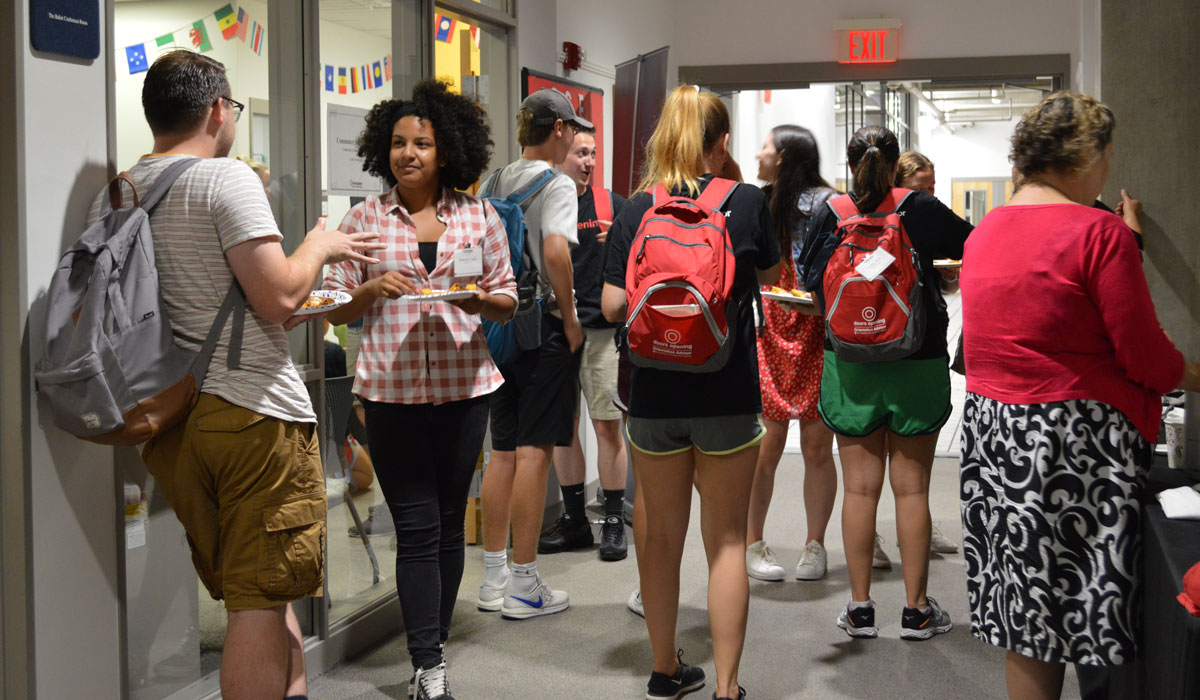
How can new students find their way around campus? What’s the best way to study? Where can one find the best food on campus?
Those were just a few of the questions first-year students had for upperclassmen during an intimate closed-door conversation in the University’s Center for Cultural Engagement on Aug. 21. For nearly an hour, the upperclassmen provided honest answers to the questions and concerns of their younger peers. Each of the students asking for advice were the first in their family to attend college in the United States. The older students opened up about their own experiences of culture shock, and offered practical advice on what they do for meals and their study tips and tricks.
The conversation session, dubbed “Real Talk,” was just a small part of Take Flight, a new daylong orientation program intended to help first-generation college students adjust to college life. Throughout the day, students in the program participated in introductory sessions about the many resources available to them, including the offices of Campus Ministry, Financial Aid, and Academic and Career Success, among others. Students also had the opportunity to get to know University deans and staff members, and each other.
Javier Bustamante, director of the Center for Cultural Engagement, said the goal of the day was to “give first-generation students a head start” for the challenges of college.
“Having been a first-generation student myself, I know I went to college and I didn’t take advantage of a number of resources because of my lack of awareness,” he said. “For most of these students, even getting to college is something they did on their own. Their parents might have been involved, but they weren’t able to provide some of the advice other parents who had been to college would know. We want students to have a community of people who are on the same journey as they are, to know there’s a place where they can ask questions, and that there are no dumb questions.”
In addition to the orientation day, Take Flight also includes a year-long mentorship program pairing first-year students with upperclassmen in the Center for Cultural Engagement. Throughout the year, the students will have the opportunity to attend events around the Washington, D.C., area, as well as a First Friday discussion series on topics like study habits, financial freedom, online resources, and the keys to academic success.

The year-long program was the brainchild of senior Alyssa Aguirre, a psychology and brain sciences major who pitched the idea to Bustamante last spring.
“I just thought how great it would have been if I had a mentor to help me through my first year, especially when it came to finances and how to accept scholarships and awards,” she said. “Figuring out the finances was definitely a struggle for me and I just kept thinking about how if these students don’t have any experience at all with college, it must be even more challenging for them.”
One student grateful to participate this year was Chloe Kretschmar, from Cincinnati, Ohio, who said she felt “completely lost” throughout her entire application and admission process. After sitting through sessions dedicated to financial aid and class registration, she said she had “a much better grip” on college life.
“A program like this is really important because our culture has a problem with not realizing we are not as diverse and accommodating as we should be,” she said. “People like me, we might not have known this information and we wouldn’t have felt welcome, and if you don’t feel welcome, it’s easier to just give up and drop out.”
First-year student Brian Melendez, from Washington, D.C., was also happy to be involved in the program.
“I think it’s valuable because if you’re first-generation, you don’t really know who to turn to for certain stuff and this program has your back,” he said. “Someone will be able to give answers for a certain situation you’re in or connect you with someone who can help. And you know people in a similar situation who you can talk to.”
Aguirre said she hopes the program will continue to grow. Nearly 30 of the University’s 150 first-generation first-year students enrolled in the program this year. In the future, she hopes every first-generation student will be able to participate and be welcomed to campus.
“I know it took me until the second semester my freshman year to find somewhere where I belonged here,” she said. “I hope this helps them really feel comfortable and reminds them of all these resources and clubs they can join to be part of the University community.”